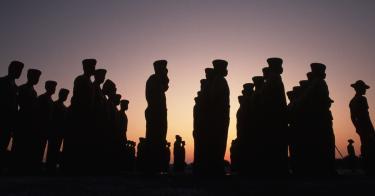A military service can be many things. It may focus on preparing for big wars or small ones; battles abroad or closer to the homeland; doing nearly everything pretty well or specializing in doing fewer things extraordinarily well.
The Marine Corps has decided what it needs to be: markedly different than what it currently is in its tactical formations, weaponry, and uses, but very much the same in its approach to war and its tradition of adapting to new challenges.
The service has concluded that America’s primary challenges lie in the Indo-Pacific region, that China will remain America’s chief competitor for many years to come, that the environment in which military action might occur has gotten dramatically more complicated and lethal, and that the Marines are currently ill-postured and ill-equipped for that environment. They are in the process of reinventing themselves to deal with these realities.
Critics of the Corps’ efforts have assailed them for ditching things like tanks and conventional artillery that proved to be essential in past wars. They bewail the focus on China and the Indo-Pacific as ignoring other potential theaters of action and other threats such as terrorist groups. They condemn the Marines’ intent to return to the sea (i.e., focus on the key mission of seizing maritime terrain to enable projection of U.S. naval power) as shortsighted and dangerous, leaving the Corps unable to conduct sustained operations ashore as it has in Afghanistan and Iraq.
Curiously, the military is often criticized for fighting the last war, failing to anticipate and reorient in response to changes in global threats, and failing to take advantage of new technologies like robotics, lasers, artificial intelligence and cyberweapons. Yet here we have the Marines doing all of these things and still it gets thwacked.
The commandant of the Marine Corps, Gen. David Berger, is working mightily to reorient the Corps to meet new challenges and give the U.S. a military capability it does not have but will surely need as China continues to provocatively stretch its authoritarian reach across half the globe, a majority of the world’s people, and much of the world’s economic activity.
If the U.S. and its allies wish for peace, then deterrence is the key to keeping war from happening. Deterrence is based on the premise that one’s opponent believes you have the ability to cause more pain in response to their aggression than the benefit they hope to gain. And allies are more likely to remain in your camp and stand against a regional bully if they too believe you have the ability to do something to stop the bully’s aggression.
As things currently stand, the U.S. military has significant shortfalls that cause allies to question America’s ability to stand against bullies and that incentivize the bullies to act ever more dangerously.
The Corps intends to develop the tools, tactics, formations, and methods that will enable them to not only operate within the deadly envelope being created by China but to operate offensively so as to deny China an easy ability to achieve its objectives.
Happily, the capabilities the Corps is determined to develop with China in mind will have utility against other enemies in other places. We’re talking small units with reduced signatures, employing the latest technologies and supported by a range of uncrewed systems — nimble, combat-relevant and lethally effective.
Isn’t that what we want our military to do?
The Corps needs the support of Congress, this administration and those that follow. But it also needs the support of the Old Corps, many of whom are nervous about the changes taking place.
Recognizing that new battlefields often demand new approaches, Gen. Berger envisions a Marine Corps that is different in some of its forms, weapons and concepts, so that Marines can continue to be the nation’s force-in-readiness. And that is very much the same cloth that previous generations of Marines have honorably worn.
This piece originally appeared in The Washington Times



